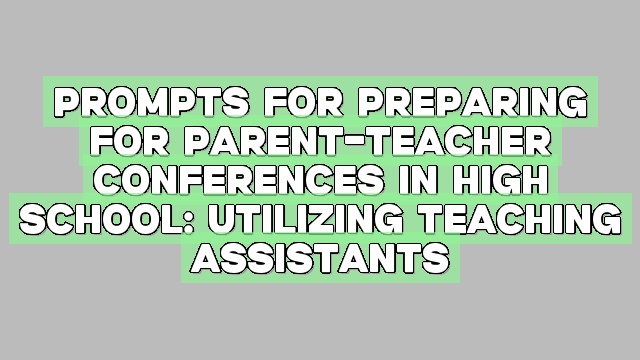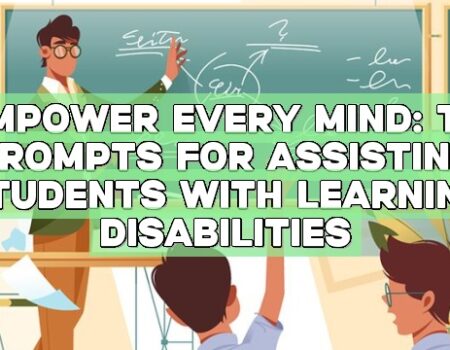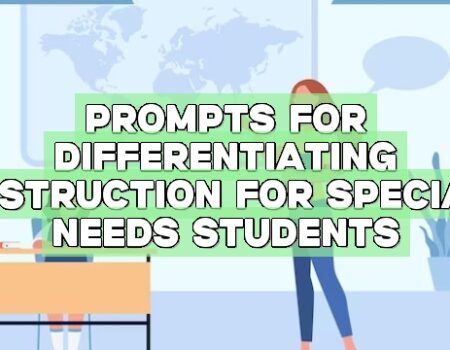Parent-teacher conferences provide an invaluable opportunity for parents and teachers to collaborate on student performance, establish goals, and address concerns. Effective preparation can enhance the outcomes of these meetings, and teaching assistants (TAs) play a critical role in facilitating communication between parents and teachers. By utilizing prompts, both parties can have a more productive and fruitful meeting.
As a teaching assistant, it is essential to understand the significance of parent-teacher conferences. These meetings are an opportunity for parents to gain insight into their child’s academic and social progress, while teachers can receive valuable input from parents to improve teaching methods and strategies. Preparing prompts for these conferences can help both parents and teachers ensure they have the best possible conversation and achieve their desired outcomes.
Key Takeaways
- Effective preparation is crucial for successful parent-teacher conferences in high school.
- Teaching assistants play an important role in facilitating communication between parents and teachers.
- Using prompts can help parents and teachers have more productive and fruitful meetings.
The Role of Teaching Assistants in Parent-Teacher Conferences
Teaching assistants (TAs) play a crucial role in facilitating communication between parents and teachers during parent-teacher conferences. As a TA, you are often in a unique position to provide valuable insights regarding student progress and behavior. TAs often work closely with students and have a firsthand understanding of their strengths, weaknesses, and learning styles.
During a parent-teacher conference, TAs can help by summarizing the student’s academic performance, highlighting areas that need improvement, and suggesting strategies for achieving academic success. TAs can also assist in identifying specific concerns and addressing them by offering additional support and resources. This can help parents and teachers work collaboratively towards common goals.
The Importance of Planning and Preparation
Effective planning and preparation are essential for successful parent-teacher conferences. As a TA, you can assist both parents and teachers in preparing for the meeting by providing information about student progress and offering suggestions for discussion topics. It is important to ensure that all parties are prepared and have a clear understanding of the purpose of the conference.
During the conference, TAs can actively participate in discussions, helping to clarify points and providing additional information when necessary. This can help to create a more open and collaborative environment, leading to better outcomes for students.
Effective Prompt Examples for Preparing for Parent-Teacher Conferences
Preparing for parent-teacher conferences can be overwhelming, but using prompts can help create a focused and productive discussion. Here are some effective prompts that can guide your preparation and facilitate communication with your child’s teacher:
- Understanding student performance: Ask the teacher to provide specific examples of your child’s strengths and weaknesses in the subjects they are studying. Use this information to reflect on how you can support your child’s learning at home.
- Addressing concerns: Identify any concerns or issues you may have about your child’s academic progress or behavior. Prepare questions to discuss with the teacher to help you better understand the situation.
- Setting goals: Collaborate with the teacher to set goals for your child’s academic progress and identify ways to support them. Develop a plan of action together to help your child achieve these goals.
- Fostering collaborative problem-solving: Discuss ways you and the teacher can work together to support your child’s academic success. This can include strategies to address any challenges or obstacles they may be facing.
Using these prompts can help you focus your conversation with your child’s teacher, ensure that you cover important topics, and work together to support your child’s academic success.
Utilizing ChatGPT for Preparing Parent-Teacher Conference Prompts
Preparing for parent-teacher conferences can be a daunting task, especially with the need to come up with effective prompts that cater to each student’s unique needs. Fortunately, the use of artificial intelligence (AI) tools such as ChatGPT can make this process more manageable and efficient.
ChatGPT is an AI-powered language model that can generate high-quality prompts tailored to individual students. It uses natural language processing (NLP) techniques to analyze and understand the context of the discussion, providing prompts that are relevant and actionable.
| Benefits of Using ChatGPT for Preparing Prompts | How ChatGPT Works |
|---|---|
| Step 1: Input the relevant information about the student, such as their academic performance, strengths, and weaknesses Step 2: ChatGPT analyzes the information and generates personalized prompts based on the context of the conference Step 3: The prompts are then reviewed and customized by the teacher or TA to ensure they are aligned with the conference objectives |
The use of ChatGPT can not only save time but also improve the quality of prompts provided for parent-teacher conferences. With AI-generated prompts, teachers and TAs can provide a more personalized and comprehensive approach to parent-teacher conferences, resulting in better outcomes for students.
Breaking Down Complex Tasks with Longer Prompts
Parent-teacher conferences can be overwhelming, especially when discussing complex tasks that require detailed explanations. This is where longer prompts can be helpful in breaking down the task and providing necessary context. By using longer prompts, parents and teachers can delve deeper into the issue at hand and arrive at comprehensive insights into student performance.
Longer prompts can also offer guidance on how to approach the given task, including step-by-step instructions on how to tackle the problem. This can be especially useful when the task is particularly challenging or requires a specific skill set.
Another advantage of longer prompts is that they can promote greater engagement during the conference. By providing more detailed information, parents and teachers can generate more discussion around the issue and arrive at more effective solutions. This can lead to better outcomes in terms of student performance and academic success.
Overall, longer prompts can be a valuable tool in parent-teacher conferences, helping to break down complex tasks, provide guidance and context, and encourage greater engagement and discussion. Utilizing them can lead to more productive conferences and better outcomes for students.
Example Prompts and Responses from ChatGPT
To better understand the practical application of ChatGPT in preparing for parent-teacher conferences, here are some real-life examples of prompts generated by the AI-powered tool:
“Can you provide an overview of my child’s performance in your class?”
Response from ChatGPT: “Your child has shown consistent improvement in their classwork and has demonstrated strong critical thinking skills in their assignments.
“What areas does my child need to improve in to be successful in your class?”
Response from ChatGPT: “Your child could benefit from additional practice in time management and organization, and may need extra support in the upcoming unit on algebra.”
“How can we work together to support my child’s academic success?”
Response from ChatGPT: “Collaboration between parents, teachers, and students is key to academic success. Some strategies that have been successful include setting shared goals, establishing regular check-ins, and maintaining open communication.”
As demonstrated by these examples, ChatGPT offers a personalized and comprehensive approach to generating effective prompts for parent-teacher conferences. By utilizing this AI-powered tool, educators and TAs can further enhance their preparation and foster positive outcomes for students.
Strategies for Implementing Prompts in Parent-Teacher Conferences
Effective implementation of prompts during parent-teacher conferences can greatly enhance communication, foster collaboration, and achieve positive outcomes. The following strategies can guide teachers and teaching assistants in implementing prompts successfully:
- Introduce prompts clearly: Prior to the conference, inform parents about the use of prompts and their purpose. Explain how prompts can help structure discussions, focus on important topics, and promote collaboration between parents and teachers.
- Use prompts as conversation starters: Discuss the prompts with parents and ask for their feedback. Allow them to share their perspectives and concerns before providing your own views. This will encourage collaboration and create a positive atmosphere for discussion.
- Encourage open discussions: Use prompts to facilitate open-ended questions and prompt parents to share their thoughts freely. Encourage them to ask questions and provide feedback, as this will lead to a deeper understanding of the student’s performance and progress.
- Elaborate on the prompts: Use the prompts as a guide to provide context and helpful insights. Describe specific examples of student performance, offer recommendations for improvement, and provide evidence to support your views. This will ensure parents have a comprehensive understanding of the situation.
- Focus on collaborative problem-solving: Use prompts to encourage parents and teachers to work together to find solutions to problems and identify ways to improve the student’s academic progress. This will foster a sense of collaboration and shared goals.
Implementing these strategies can enhance the effectiveness of parent-teacher conferences and lead to positive outcomes. By empowering parents with prompts and encouraging collaboration, teachers and teaching assistants can work towards achieving the best possible academic outcomes for their students.
Enhancing Communication and Collaboration through Prompts
Effective communication and collaboration between parents and teachers during high school conferences is essential for supporting students’ academic success. Prompts can play a critical role in achieving this goal by providing a structure for discussions and facilitating a comprehensive exchange of information. By implementing prompts during parent-teacher conferences, high schools can enhance the quality of communication and collaboration among all stakeholders involved.
Clear and Concise Prompts
Clear and concise prompts are essential for fostering productive discussions between parents and teachers during conferences. Prompts should be phrased in a way that is easy to understand and follow, highlighting specific areas of concern or interest. This approach can help to facilitate a more focused and productive conversation that addresses the most critical issues in a timely and efficient manner. By using clear and concise prompts, high schools can promote effective communication and collaboration among all stakeholders.
Open and Collaborative Discussions
Prompts can also help to promote open and collaborative discussions between parents and teachers during conferences. By providing a structure for discussions, prompts can help to ensure that all stakeholders have an opportunity to share their perspectives and insights. This approach can help to promote a sense of collaboration and shared ownership in addressing the challenges and opportunities facing students. By using prompts to promote open and collaborative discussions, high schools can foster a culture of communication and collaboration that benefits all stakeholders.
Collaborative Problem-Solving
Collaborative problem-solving is another critical aspect of effective communication and collaboration during high school conferences. Prompts can help to facilitate this process by providing a structure for identifying and addressing the most significant challenges facing students. By using prompts to foster collaborative problem-solving, high schools can promote a sense of shared ownership in addressing the challenges and opportunities facing students.
Conclusion
Effective communication and collaboration are essential for supporting students’ academic success during high school conferences. By using prompts to enhance the quality of communication and collaboration among all stakeholders, high schools can promote a culture of shared ownership in addressing the challenges and opportunities facing students. Clear and concise prompts, open and collaborative discussions, and collaborative problem-solving are critical elements of this approach.
Achieving Positive Outcomes with Well-Prepared Prompts
Using well-prepared prompts during parent-teacher conferences can lead to a range of positive outcomes for students, parents, and teachers. By providing a structured approach towards discussing academic progress, addressing concerns, and setting goals, prompts can facilitate deeper and more productive conversations between all parties involved.
One of the main advantages of well-prepared prompts is that they can help parents and teachers develop a better understanding of students’ academic strengths and weaknesses. By focusing on key areas such as performance in different subjects, study habits, and time management, prompts can provide a comprehensive overview of students’ progress. This, in turn, can lead to more targeted and effective support, helping students reach their full potential.
Another positive outcome of using prompts is increased parental involvement in students’ education. By providing parents with a clear framework for discussing academic progress, prompts can encourage them to take a more active role in supporting their children’s learning. This can range from helping with homework and assignments to providing guidance on career paths and further education.
Well-prepared prompts can also enhance communication between parents and teachers, as well as foster collaboration towards shared goals. By creating a structured and collaborative approach towards discussing academic progress, concerns, and goals, prompts can help build trust and encourage open communication between all parties involved. This, in turn, can lead to more effective problem-solving and a greater sense of shared responsibility towards students’ success.
In conclusion, using well-prepared prompts during parent-teacher conferences can help achieve a range of positive outcomes, including better understanding of students’ academic progress, increased parental involvement, and enhanced communication and collaboration between parents and teachers. By implementing effective prompt strategies, high school conferences can be empowered to achieve their full potential in supporting students’ academic success.
Conclusion: Empowering High School Conferences with Prompts
In conclusion, effective preparation for parent-teacher conferences in high school is crucial for achieving positive outcomes. Teaching assistants play an important role in facilitating communication between parents and teachers, and well-prepared prompts can enhance discussions and promote collaborative problem-solving. Utilizing ChatGPT can provide tailored and effective prompts, while longer prompts can break down complex tasks and offer comprehensive insights into student performance.
Implementing prompts during parent-teacher conferences requires strategies and best practices for promoting open discussions and eliciting valuable input from both parents and teachers. Clear and concise prompts can enhance communication and collaboration, leading to better understanding, increased parental involvement, and enhanced support for students’ academic success.
We encourage high school administrators, teachers, and parents to implement these strategies and utilize prompts to maximize the effectiveness of parent-teacher conferences. Empowering these conferences with prompts can lead to stronger partnerships and better support for students’ academic progress.
FAQ
Q: What is the role of teaching assistants in parent-teacher conferences?
A: Teaching assistants play a vital role in parent-teacher conferences by facilitating communication between parents and teachers, supporting students’ academic progress, and providing valuable insights during the meetings.
Q: Why are prompts important for preparing for parent-teacher conferences?
A: Prompts are important for preparing for parent-teacher conferences because they help in understanding student performance, addressing concerns, setting goals, and fostering collaborative problem-solving between parents and teachers.
Q: How can ChatGPT be used to generate prompts for parent-teacher conferences?
A: ChatGPT can be utilized to generate prompts for parent-teacher conferences by leveraging its AI-powered capabilities, ensuring comprehensive and tailored preparation for the meetings.
Q: What are the benefits of using longer prompts for complex tasks during conferences?
A: Longer prompts are beneficial for complex tasks during parent-teacher conferences as they provide necessary context, facilitate deeper discussions, and offer comprehensive insights into student performance.
Q: Can you provide examples of prompts generated by ChatGPT for parent-teacher conferences?
A: Yes, we will provide real-life examples of prompts generated by ChatGPT for parent-teacher conferences, along with sample responses, to demonstrate the effectiveness and versatility of AI-generated prompts.
Q: What strategies can be implemented for using prompts effectively during parent-teacher conferences?
A: Strategies for using prompts effectively during parent-teacher conferences include introducing prompts in a clear and concise manner, promoting open discussions, and eliciting valuable input from both parents and teachers.
Q: How can prompts enhance communication and collaboration between parents and teachers during conferences?
A: Prompts enhance communication and collaboration between parents and teachers during conferences by fostering productive discussions, addressing concerns, and working towards shared goals in a clear and concise manner.
Q: What positive outcomes can be achieved with well-prepared prompts in parent-teacher conferences?
A: Well-prepared prompts in parent-teacher conferences can lead to better understanding, increased parental involvement, and enhanced support for students’ academic success, ultimately resulting in positive outcomes.









